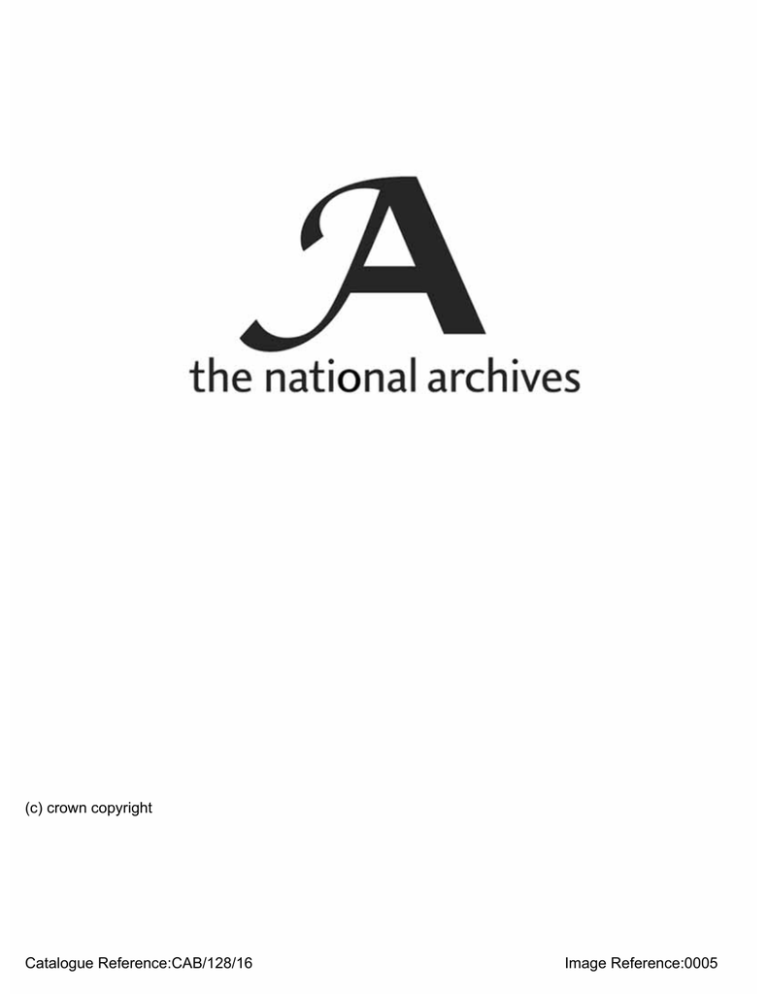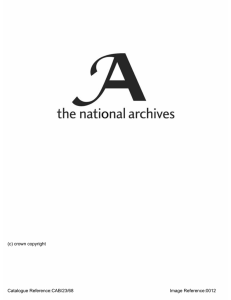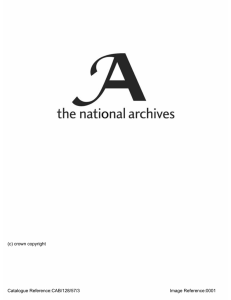(c) crown copyright Catalogue Reference:CAB/128/16 Image Reference:0005
advertisement

(c) crown copyright Catalogue Reference:CAB/128/16 Image Reference:0005 THIS DOCUMENT IS T H E PROPERTY OP H I S BRITANNIC MAJESTVS GOVERNMENT Printed for the Cabinet. - July 1 9 4 9 Gd&TNo. 4 4 SECRET C M . (49) 48th Conclusions CABINET 48 (49) CONCLUSIONS of a Meeting of the Cabinet held at 1 0 Downing Street, S.W. 1, on Monday, 25th July. 1949, at 1 1 a.m. Present: The Right Hon. C. R. ATTLEE, M.P., Prime Minister (in the Chair). The Right Hon. HERBERT MORRISON, The Right Hon. A . . V . ALEXANDER, M.P., Minister of Defence. M.P., Lord President of the Council. The Right Hon. HUGH DALTON, M.P., - Chancellor of the Duchy of Lancaster. The Right Hon. VISCOUNT JOWITT, Lord Chancellor-. The Right Hon. VISCOUNT ADDISON, Lord Privy Seal. The Right Hon. J . CHUTER EDE, M.P., Secretary of State for the Home Department. The Right Hon. A. CREECH JONES, M.P., Secretary of State for the Colonies. The Right Hon. A . WOODBURN, M.P., The Right Hon. G. A. ISAACS, M . P . , Minister of Labour and National Service. The Right Hon. ANEURIN BEVAN, M.P., Minister of Health. The Right Hon. T. WILLIAMS, M.P., Agriculture and Minister of Fisheries. The Right Hon. GEORGE TOMLINSON, M.P., Minister of Education. Secretary of State for Scotland. The Right Hon. J . H . WILSON, M.P., President of the Board of Trade. The following were also present: The Right Hon. JOHN STRACHEY, M.P., The Right Hon. G . R. STRAUSS, M.P., Minister of Supply. Minister of Food. The Right Hon. H. T. N . GAITSKELL, The Right Hon. LORD PAKENHAM, M.P., Minister of Fuel and Power. Minister of Civil Aviation. The Right Hon. HECTOR MCNEIL, M.P., The Bight Hon. WILLIAM WHITELEY, M.P., Parliamentary Secretary, Minister of State. Treasury (Item 1 ) . Mr. DOUGLAS JAY, M.P. Economic Sir EDWARD BRIDGES, Treasury. Secretary, Treasury. Secretariat: Sir NORMAN BROOK. Mr. A. JOHNSTON. Mr. S. E. V . LUKE. 37382-2 B CABINET 48 (49)) CONTENTS Minute No. 1 Subject Industrial Disputes .... .... ­ .... Page 119 L o n d o n D o c k Strikes. Railway Dispute.. Colliery W i n d e r s ' D i s p u t e . , 2 Meeting of CommonwealthFinance- Ministers 3 The Economic Situation­ *" .... .... 120 .... ..... 121 Industrial Disputes. London Dock Strikes. (Previous Eef erenee: C.M.(49)47th Conclusions, Minute 7.) 1. The Home Secretary said that, as the dock workers who­ had been on strike in the London docks had decided to resume work that morning, he would, in the ordinary course, have recommended that H i s Majesty should be advised forthwith to issue a proclama­ tion under the Emergency Powers Act, 1920, declaring that the state of emergency was at an end. The issue of such a proclamation would have the effect of revoking the Emergency Regulations which had been made under the Act. A meeting of the National Dock Labour Board was, however, being held that day, and it was believed that at this meeting Lord Ammon might propose that disciplinary action should be taken against some of the strikers. Such a proposal might well provoke a further stoppage of work in the London docks. The Home Secretary therefore recommended that the emergency powers should not be revoked, and that the troops which had been working in the London docks should.not be dispersed, until the results of this meeting were known. I n discussion it was agreed that a message should be sent at once to the National Dock Labour Board informing them that, as the state of emergency had not yet been formally brought to an end, they were not at liberty to carry into effect any decision of policy without prior consultation with the Emergency Committee for the Port of London. The Cabinet were informed that the proclamation declaring the state of emergency to be at an end would have to be notified formally to Parliament, and it was possible that the leaders of the Opposition would wish to make this the occasion for a general debate in the House of Commons on the Governments handling of the strike. , The C a b i n e t ­ (1) Invited the Minister of Labour to arrange for the National Dock. Labour Board to be informed forthwith (by a telephone message to be confirmed by letter) that, until the state of emergency had been formally brought to an end, they were not at liberty to carry into effect any decision of policy without prior consultation with the Emergency Committee for the Port of London. (2) Authorised the Home Secretary, in consultation with the Lord President, to decide in the light of the results of that day's meeting of the National Dock Labour Board when His Majesty should be advised to terminate the state of emergency which had been declared under the Emergency Powers Act, 1920. (3) Authorised the Home Secretary to decide when the troops which had been working in the London docks could safely be dispersed. (4) Invited the Lord President, in consultation with the Prime Minister, to make the necessary arrangements for notifying Parliament of the ending of the state of emer­ geiicy and for the handling of any debate in the House of Commons. Railway Dispute. (Previous Reference: O.M.(49)43rd Conclusions, Minute 4.) The Minister of Labour informed the Cabinet of the course of the negotiations with the Railway Unions on the handling of their current wages claim. Four Unions were involved, and separate applications had been made to four sets of employers. At an earlier stage it had been suggested that all the claims might be referred to a special Board of Conciliation, but one of the Unions concerned (representing the railway shopmen) had preferred that its applica­ tion should be handled through its own conciliation machinery. The Minister had therefore proposed that he should appoint a Board 3 7 3 8 2 - 2 B 2 of Conciliation to consider the claims of the men represented by the three other Unions. Two of these Unions had already accepted this proposal, and the National Union of Eailwaymen were con­ sidering it at a meeting that day. The Cabinet took note of the position. Colliery Winders' Dispute. The Minister of Labour informed the Cabinet that the Colliery Winders' Federation had submitted a wages claim to the National Coal Board in December, 1948, and, not having obtained satisfac­ tion, had now given strike notices which would become effective in 21 days' time. Although this action was based upon a wages claim the issue underlying the dispute was one between the Colliery Winders' Federation and the National Union of Mineworkers—the former asserting, and the latter opposing, the right of the Federation to be recognised as the negotiating body for the winding enginemen. The Cabinet took note of this statement. Meeting of 2. The Cabinet considered a memorandum by the President Commonwealth of the Board of Trade ( C P . (49) 160) reporting the results of the Finance Meeting of the Commonwealth Finance Ministers held in London Ministers. from 13th to 18th July. The President of the Board of Trade said that at this Meeting a remarkable measure of agreement had been reached on both the short-term and the long-term objectives of policy. The recommenda­ tions of the Meeting on long-term policy would form part of the brief for United Kingdom Ministers in the forthcoming economic discussions at Washington: in general, the Meeting had agreed that the basic aim must be the achievement of a pattern of world trade in which the dollar and non-dollar countries could operate together within one single multilateral system. Commonwealth Ministers had increasingly appreciated, as the Meeting proceeded, the pressing need for substantial reductions in dollar expenditure, but some time must necessarily elapse before any measures which their Governments might adopt could show substantial results. Since the Meeting had ended, there had been further discussions between officials, and good progress had been made in working out proposals for increasing doll ar earnings and substituting United Kingdom imports for dollar imports in Commonwealth countries. I n discussion the following points were made :— (a) The Minister of Food said that the Indian Government Were exploring the possibilities of obtaining further wheat from non­ dollar sources. Some might be bought in the Soviet Union, but it might also be necessary to consider the diversion of Australian wheat from the United Kingdom to India. He thought that quantities up to 500,000 tons might be so diverted if we could be assured that we should be able to obtain compensating supplies from the Soviet Union or Argentina. The Cabinet agreed in principle that, if this assurance was forthcoming, Australian wheat might be diverted from the United Kingdom to India. (b) The Australian and New Zealand Finance Ministers had taken the initiative in raising the question whether part of the supplies of butter and meat now exported to the. United Kingdom could be diverted to the United States market. I t was, however, doubtful whether there was a market for these supplies in the United States at the present time; and if it became known that, these products were being exported to the United States there was grave risk that the Governments of Australia and New Zealand would be unable to maintain their existing ration arrangements. The Cabinet agreed that this suggestion should not be further pursued. (c) The Canadian representatives at the recent Meeting had made it clear that their Government would be reluctant to contem­ plate any major changes of economic policy. Their aim was still to restore the pre-war pattern of trade, under which the sterling area financed Canada's deficit with the United States. I t would be necessary to have frank and comprehensive discussions with the Canadian Government on the whole question of Canada's future trade relations with the sterling area, but the Chancellor of the Exchequer had felt that it was preferable that these talks should be deferred until September. The general view of the Cabinet was that no time should be lost in determining the policy which United Kingdom Ministers should pursue in ,the proposed discussions with the Canadian Government. Our deficit with Canada was a major factor in our present economic difficulties, and it was a matter for serious concern that the Canadian Government should have so far shown themselves unwilling to co-operate in pleasures which might materially alleviate our difficulties. While it might not be possible to hold further Ministerial talks until September, it might be advisable in the meantime for the United Kingdom High Commissioner in Canada to give the Canadian Government at least a preliminary warning of our views. I t was agreed that the Cabinet should consider at an early meeting what proposals might be made to the Canadian Government; and, in this connection, it was suggested that no effective solution would be found unless the Canadian Government were prepared to receive payment in sterling for some part of the purchases made in Canada by the United Kingdom and other sterling area countries, and to adopt a tariff policy involving dis­ crimination against the United States. The C a b i n e t ­ (1) Endorsed the recommendations of the Meeting of Common­ wealth Finance Ministers annexed to C P . (49) 160 and agreed that, subject to the approval of the other Common­ wealth Governments, these should be shown confidentially to members of the United States Administration. (2) Invited the President of the Board of Trade to circulate a paper on the question of Canada's future trade relations with the sterling area. TbeEoonomlo 3. The Cabinet had before them memoranda on the economic SituafeloB. situation by the Prime Minister ( C P . (49) 158) and the Lord President ( C P . (49) 159). The Prime Minister said that he had thought it right to place before his colleagues figures showing the continued drain on the gold and dollar reserves of the sterling area. The gold and dollar deficit for the week ended 16th July had amounted to 46-5 million dollars and, because of the settlement in the week ended 23rd July of the sterling area deficits with Belgium and Switzerland, the gold and dollar deficit for that week was likely to amount to 70 million dollars. These figures suggested that by the end of September the reserves would have fallen to little more than £300 million. I t was pointed out in discussion that the general position had not materially changed since the beginning of the month, save that the drain on the reserves had proved to be slightly heavier than had been expected, and t h a t the talks with the United States Secre­ tary to the Treasury and the Commonwealth Finance Ministers had not materially improved the short-term situation. The Chancellor of the Exchequer had contemplated that the reserves would fall to somewhere about £300 million by 30th September. Whether it would be possible at that stage to prevent a further deterioration of the economic situation would probably depend on the value of the short-term measures which had already been taken, and on the prospects of finding effective long-term measures of amelioration in the forthcoming discussions in Washington. Ministers next discussed the extent to which the short-term measures already taken would fructify before the Chancellor of the Exchequer and the Foreign Secretary went to Washington for discussions in September, and whether further short-term measures should be considered. Reference was made to the following points:-r . (a) The stand-still in dollar purchases was not likely to show much effect until the fourth quarter of the year. (6) I t was a hopeful sign that rubber was now being bought in the New York market; that United States purchases of tin had been resumed; and that diamond buyers had arrived in London from the United States. These developments suggested that there had been some revival of confidence in sterling. (c) The United States Government were now showing good will, which had hitherto been lacking, towards India's application for a loan from the International Monetary Fund and the Inter­ national Bank. No decision on this application could, however, be taken until September. (d) The United States Government should now be pressed to make quicker progress with the stockpiling of essential commodities. This matter had been discussed with the United States Secretary to the Treasury during his visit to London, and Congress had now granted the necessary appropriations which would enable purchases to be made. Purchases of rubber for stockpiling had commenced, but His Majesty's Ambassador in Washington, when he returned to the United States at the end of the month, should take with him an up-to-date appreciation of the position and an indication of the commodities of which immediate purchases might be made. An endeavour might also be made to induce the Canadian Government to engage in stockpiling., But even if both these Governments could be persuaded to take such action within the next - few weeks, it Would be several months before the results would show themselves in the balance of payments figures. (e) This country was committed to import 300,000 tons of special steels from Belgium and deliveries were likely to continue for several months. The heavy deficit with Belgium in the year ended 30th June would not. however, continue since, under the new European payments s c h ^ s ^ ^ ^ j m ^ ^ i i l d not receive more than $40 million in gold from all European countries. Our trade with Belgium might present difficulties, but the extent of these difficulties had been greatly reduced by the terms of the new payments scheme. (/) There was not the same danger as in 1947 of a run on sterling because of the absence of full convertibility and because of the agreements blocking sterling balances. As regards delays by exporters and importers, there was a limit to the extent to which such settlements could be postponed, and that limit had probably been reached. At the same time it Would be well not to under­ estimate the danger of a quickening of the drain on the gold and dollar reserves, if it were thought that devaluation would be forced on the United Kingdom Government. There was general agreement that the situation would have to be further examined before the Summer Recess from the point of view of external and internal policies, in order to ensure that the negotiations in Washington in September were not conducted under conditions which would place the Chancellor of the Exchequer and the Foreign Secretary i n a position of great weakness. The C a b i n e t ­ (1) Invited the President of the Board of Trade to submit on behalf of the Treasury a note of the interim measures which might be recommended to the Governments of the United States and Canada with a view to checking the drain on the gold and dollar reserves of the sterling area. (2) Agreed to resume a t a further meeting later in the week ­ their discussion of the economic situation. Cabinet Office, S.W.1, 25th July, 1949.




